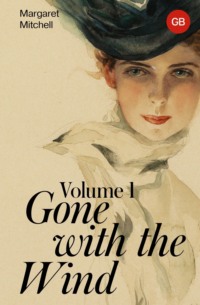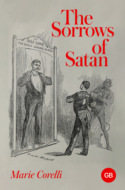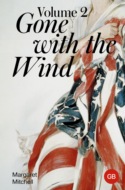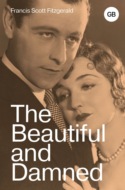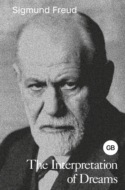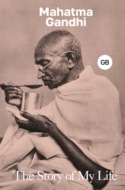Kitabı oku: «Gone with the Wind. Volume 1 / Унесенные ветром. Том 1», sayfa 9
* * *
Scarlett sat on a high rosewood ottoman, under the shade of a huge oak in the rear of the house, her flounces and ruffles billowing about her and two inches of green morocco slippers-all that a lady could show and still remain a lady-peeping from beneath them. She had scarcely touched plate in her hands and seven cavaliers about her. The barbecue had reached its peak and the warm air was full of laughter and talk, the click of silver on porcelain and the rich heavy smells of roasting meats and redolent gravies. Occasionally when the slight breeze veered, puffs of smoke from the long barbecue pits floated over the crowd and were greeted with squeals of mock dismay from the ladies and violent flappings of palmetto fans.
Most of the young ladies were seated with partners on the long benches that faced the tables, but Scarlett, realizing that a girl has only two sides and only one man can sit on each of these sides, had elected to sit apart so she could gather about her as many men as possible.
Under the arbor sat the married women, their dark dresses decorous notes in the surrounding color and gaiety. Matrons, regardless of their ages, always grouped together apart from the bright-eyed girls, beaux and laughter, for there were no married belles in the South. From Grandma Fontaine, who was belching frankly with the privilege of her age, to seventeen-year-old Alice Munroe, struggling against the nausea of a first pregnancy, they had their heads together in the endless genealogical and obstetrical discussions that made such gatherings very pleasant and instructive affairs.
Casting contemptuous glances at them, Scarlett thought that they looked like a clump of fat crows. Married women never had any fun. It did not occur to her that if she married Ashley she would automatically be relegated to arbors and front parlors with staid matrons in dull silks, as staid and dull as they and not a part of the fun and frolicking. Like most girls, her imagination carried her just as far as the altar and no further. Besides, she was too unhappy now to pursue an abstraction.
She dropped her eyes to her plate and nibbled daintily on a beaten biscuit with an elegance and an utter lack of appetite that would have won Mammy's approval. For all that she had a superfluity of beaux, she had never been more miserable in her life. In some way that she could not understand, her plans of last night had failed utterly so far as Ashley was concerned. She had attracted other beaux by the dozens, but not Ashley, and all the fears of yesterday afternoon were sweeping back upon her, making her heart beat fast and then slow, and color flame and whiten in her cheeks.
Ashley had made no attempt to join the circle about her, in fact she had not had a word alone with him since arriving, or even spoken to him since their first greeting. He had come forward to welcome her when she came into the back garden, but Melanie had been on his arm then, Melanie who hardly came up to his shoulder.
She was a tiny, frailly built girl, who gave the appearance of a child masquerading in her mother's enormous hoop skirts-an illusion that was heightened by the shy, almost frightened look in her too large brown eyes. She had a cloud of curly dark hair which was so sternly repressed beneath its net that no vagrant tendrils escaped, and this dark mass, with its long widow's peak, accentuated the heart shape of her face. Too wide across the cheek bones, too pointed at the chin, it was a sweet, timid face but a plain face, and she had no feminine tricks of allure to make observers forget its plainness. She looked-and was-as simple as earth, as good as bread, as transparent as spring water. But for all her plainness of feature and smallness of stature, there was a sedate dignity about her movements that was oddly touching and far older than her seventeen years.
Her gray organdie dress, with its cherry-colored satin sash, disguised with its billows and ruffles how childishly undeveloped her body was, and the yellow hat with long cherry streamers made her creamy skin glow. Her heavy earbobs with their long gold fringe hung down from loops of tidily netted hair, swinging close to her brown eyes, eyes that had the still gleam of a forest pool in winter when brown leaves shine up through quiet water.
She had smiled with timid liking when she greeted Scarlett and told her how pretty her green dress was, and Scarlett had been hard put to be even civil in reply, so violently did she want to speak alone with Ashley. Since then, Ashley had sat on a stool at Melanie's feet, apart from the other guests, and talked quietly with her, smiling the slow drowsy smile that Scarlett loved. What made matters worse was that under his smile a little sparkle had come into Melanie's eyes, so that even Scarlett had to admit that she looked almost pretty. As Melanie looked at Ashley, her plain face lit up as with an inner fire, for if ever a loving heart showed itself upon a face, it was showing now on Melanie Hamilton's.
Scarlett tried to keep her eyes from these two but could not, and after each glance she redoubled her gaiety with her cavaliers, laughing, saying daring things, teasing, tossing her head at their compliments until her earrings danced. She said “fiddle-dee-dee” many times, declared that the truth wasn't in any of them, and vowed that she'd never believe anything any man told her. But Ashley did not seem to notice her at all. He only looked up at Melanie and talked on, and Melanie looked down at him with an expression that radiated the fact that she belonged to him.
So, Scarlett was miserable.
To the outward eye, never had a girl less cause to be miserable. She was undoubtedly the belle of the barbecue, the center of attention. The furore she was causing among the men, coupled with the heart burnings of the other girls, would have pleased her enormously at any other time.
Charles Hamilton, emboldened by her notice, was firmly planted on her right, refusing to be dislodged by the combined efforts of the Tarleton twins. He held her fan in one hand and his untouched plate of barbecue in the other and stubbornly refused to meet the eyes of Honey, who seemed on the verge of an outburst of tears. Cade lounged gracefully on her left, plucking at her skirt to attract her attention and staring up with smoldering eyes at Stuart. Already the air was electric between him and the twins and rude words had passed. Frank Kennedy fussed about like a hen with one chick, running back and forth from the shade of the oak to the tables to fetch dainties to tempt Scarlett, as if there were not a dozen servants there for that purpose. As a result, Suellen's sullen resentment had passed beyond the point of ladylike concealment and she glowered at Scarlett. Small Carreen could have cried because, for all Scarlett's encouraging words that morning, Brent had done no more than say “Hello, Sis” and jerk her hair ribbon before turning his full attention to Scarlett. Usually he was so kind and treated her with a careless deference that made her feel grown up, and Carreen secretly dreamed of the day when she would put her hair up and her skirts down and receive him as a real beau. And now it seemed that Scarlett had him. The Munroe girls were concealing their chagrin at the defection of the swarthy Fontaine boys, but they were annoyed at the way Tony and Alex stood about the circle, jockeying for a position near Scarlett should any of the others arise from their places.
They telegraphed their disapproval of Scarlett's conduct to Hetty Tarleton by delicately raised eyebrows. “Fast” was the only word for Scarlett. Simultaneously, the three young ladies raised lacy parasols, said they had had quite enough to eat, thank you, and, laying light fingers on the arms of the men nearest them, clamored sweetly to see the rose garden, the spring and the summerhouse. This strategic retreat in good order was not lost on a woman present or observed by a man.
Scarlett giggled as she saw three men dragged out of the line of her charms to investigate landmarks familiar to the girls from childhood, and cut her eye sharply to see if Ashley had taken note. But he was playing with the ends of Melanie's sash and smiling up at her. Pain twisted Scarlett's heart. She felt that she could claw Melanie's ivory skin till the blood ran and take pleasure in doing it.
As her eyes wandered from Melanie, she caught the gaze of Rhett Butler, who was not mixing with the crowd but standing apart talking to John Wilkes. He had been watching her and when she looked at him he laughed outright. Scarlett had an uneasy feeling that this man who was not received was the only one present who knew what lay behind her wild gaiety and that it was affording him sardonic amusement. She could have clawed him with pleasure too.
“If I can just live through this barbecue till this afternoon,” she thought, “all the girls will go upstairs to take naps to be fresh for tonight and I'll stay downstairs and get to talk to Ashley. Surely he must have noticed how popular I am.” She soothed her heart with another hope: “Of course, he has to be attentive to Melanie because, after all, she is his cousin and she isn't popular at all, and if he didn't look out for her she'd just be a wallflower.”
She took new courage at this thought and redoubled her efforts in the direction of Charles, whose brown eyes glowed down eagerly at her. It was a wonderful day for Charles, a dream day, and he had fallen in love with Scarlett with no effort at all. Before this new emotion, Honey receded into a dim haze. Honey was a shrill- voiced sparrow and Scarlett a gleaming hummingbird. She teased him and favored him and asked him questions and answered them herself, so that he appeared very clever without having to say a word. The other boys were puzzled and annoyed by her obvious interest in him, for they knew Charles was too shy to hitch two consecutive words together, and politeness was being severely strained to conceal their growing rage. Everyone was smoldering, and it would have been a positive triumph for Scarlett, except for Ashley.
When the last forkful of pork and chicken and mutton had been eaten, Scarlett hoped the time had come when India would rise and suggest that the ladies retire to the house. It was two o'clock and the sun was warm overhead, but India, wearied with the three-day preparations for the barbecue, was only too glad to remain sitting beneath the arbor, shouting remarks to a deaf old gentleman from Fayetteville.
A lazy somnolence descended on the crowd. The negroes idled about, clearing the long tables on which the food had been laid. The laughter and talking became less animated and groups here and there fell silent. All were waiting for their hostess to signal the end of the morning's festivities. Palmetto fans were wagging more slowly, and several gentlemen were nodding from the heat and overloaded stomachs. The barbecue was over and all were content to take their ease while sun was at its height.
In this interval between the morning party and the evening's ball, they seemed a placid, peaceful lot. Only the young men retained the restless energy which had filled the whole throng a short while before. Moving from group to group, drawling in their soft voices, they were as handsome as blooded stallions and as dangerous. The languor of midday had taken hold of the gathering, but underneath lurked tempers that could rise to killing heights in a second and flare out as quickly. Men and women, they were beautiful and wild, all a little violent under their pleasant ways and only a little tamed.
Some time dragged by while the sun grew hotter, and Scarlett and others looked again toward India. Conversation was dying out when, in the lull, everyone in the grove heard Gerald's voice raised in furious accents. Standing some little distance away from the barbecue tables, he was at the peak of an argument with John Wilkes.
“God's nightgown, man! Pray for a peaceable settlement with the Yankees after we've fired on the rascals at Fort Sumter? Peaceable? The South should show by arms that she cannot be insulted and that she is not leaving the Union by the Union's kindness but by her own strength!”
“Oh, my God!” thought Scarlett. “He's done it! Now, we'll all sit here till midnight.”
In an instant, the somnolence had fled from the lounging throng and something electric went snapping through the air. The men sprang from benches and chairs, arms in wide gestures, voices clashing for the right to be heard above other voices. There had been no talk of politics or impending war all during the morning, because of Mr. Wilkes' request that the ladies should not be bored. But now Gerald had bawled the words “Fort Sumter,” and every man present forgot his host's admonition.
“Of course we'll fight-” “Yankee thieves-” “We could lick them in a month-” “Why, one Southerner can lick twenty Yankees-” “Teach them a lesson they won't soon forget-” “Peaceably? They won't let us go in peace-” “No, look how Mr. Lincoln insulted our Commissioners!” “Yes, kept them hanging around for weeks- swearing he'd have Sumter evacuated!” “They want war; we'll make them sick of war-” And above all the voices, Gerald's boomed. All Scarlett could hear was “States' rights, by God!” shouted over and over. Gerald was having an excellent time, but not his daughter.
Secession, war-these words long since had become acutely boring to Scarlett from much repetition, but now she hated the sound of them, for they meant that the men would stand there for hours haranguing one another and she would have no chance to corner Ashley. Of course there would be no war and the men all knew it. They just loved to talk and hear themselves talk.
Charles Hamilton had not risen with the others and, finding himself comparatively alone with Scarlett, he leaned closer and, with the daring born of new love, whispered a confession.
“Miss O'Hara-I–I had already decided that if we did fight, I'd go over to South Carolina and join a troop there. It's said that Mr. Wade Hampton is organizing a cavalry troop, and of course I would want to go with him. He's a splendid person and was my father's best friend.”
Scarlett thought, “What am I supposed to do-give three cheers?” for Charles' expression showed that he was baring his heart's secrets to her. She could think of nothing to say and so merely looked at him, wondering why men were such fools as to think women interested in such matters. He took her expression to mean stunned approbation and went on rapidly, daringly-
“If I went-would-would you be sorry, Miss O'Hara?”
“I should cry into my pillow every night,” said Scarlett, meaning to be flippant, but he took the statement at face value and went red with pleasure. Her hand was concealed in the folds of her dress and he cautiously wormed his hand to it and squeezed it, overwhelmed at his own boldness and at her acquiescence.
“Would you pray for me?”
“What a fool!” thought Scarlett bitterly, casting a surreptitious glance about her in the hope of being rescued from the conversation.
“Would you?”
“Oh-yes, indeed, Mr. Hamilton. Three Rosaries a night, at least!”
Charles gave a swift look about him, drew in his breath, stiffened the muscles of his stomach. They were practically alone and he might never get another such opportunity. And, even given another such Godsent occasion, his courage might fail him.
“Miss O'Hara-I must tell you something. I–I love you!”
“Um?” said Scarlett absently, trying to peer through the crowd of arguing men to where Ashley still sat talking at Melanie's feet.
“Yes!” whispered Charles, in a rapture that she had neither laughed, screamed nor fainted, as he had always imagined young girls did under such circumstances. “I love you! You are the most-the most-” and he found his tongue for the first time in his life. “The most beautiful girl I've ever known and the sweetest and the kindest, and you have the dearest ways and I love you with all my heart. I cannot hope that you could love anyone like me but, my dear Miss O'Hara, if you can give me any encouragement, I will do anything in the world to make you love me. I will-”
Charles stopped, for he couldn't think of anything difficult enough of accomplishment to really prove to Scarlett the depth of his feeling, so he said simply: “I want to marry you.”
Scarlett came back to earth with a jerk, at the sound of the word “marry.” She had been thinking of marriage and of Ashley, and she looked at Charles with poorly concealed irritation. Why must this calf-like fool intrude his feelings on this particular day when she was so worried she was about to lose her mind? She looked into the pleading brown eyes and she saw none of the beauty of a shy boy's first love, of the adoration of an ideal come true or the wild happiness and tenderness that were sweeping through him like a flame. Scarlett was used to men asking her to marry them, men much more attractive than Charles Hamilton, and men who had more finesse than to propose at a barbecue when she had more important matters on her mind. She only saw a boy of twenty, red as a beet and looking very silly. She wished that she could tell him how silly he looked. But automatically, the words Ellen had taught her to say in such emergencies rose to her lips and casting down her eyes, from force of long habit, she murmured: “Mr. Hamilton, I am not unaware of the honor you have bestowed on me in wanting me to become your wife, but this is all so sudden that I do not know what to say.”
That was a neat way of smoothing a man's vanity and yet keeping him on the string, and Charles rose to it as though such bait were new and he the first to swallow it.
“I would wait forever! I wouldn't want you unless you were quite sure. Please, Miss O'Hara, tell me that I may hope!”
“Um,” said Scarlett, her sharp eyes noting that Ashley, who had not risen to take part in the war talk, was smiling up at Melanie. If this fool who was grappling for her hand would only keep quiet for a moment, perhaps she could hear what they were saying. She must hear what they said. What did Melanie say to him that brought that look of interest to his eyes?
Charles' words blurred the voices she strained to hear.
“Oh, hush!” she hissed at him, pinching his hand and not even looking at him.
Startled, at first abashed, Charles blushed at the rebuff and then, seeing how her eyes were fastened on his sister, he smiled. Scarlett was afraid someone might hear his words. She was naturally embarrassed and shy, and in agony lest they be overheard. Charles felt a surge of masculinity such as he had never experienced, for this was the first time in his life that he had ever embarrassed any girl. The thrill was intoxicating. He arranged his face in what he fancied was an expression of careless unconcern and cautiously returned Scarlett's pinch to show that he was man of the world enough to understand and accept her reproof.
She did not even feel his pinch, for she could hear clearly the sweet voice that was Melanie's chief charm: “I fear I cannot agree with you about Mr. Thackeray's works. He is a cynic. I fear he is not the gentleman Mr. Dickens is.”
What a silly thing to say to a man, thought Scarlett, ready to giggle with relief. Why, she's no more than a bluestocking and everyone knows what men think of bluestockings… The way to get a man interested and to hold his interest was to talk about him, and then gradually lead the conversation around to yourself-and keep it there. Scarlett would have felt some cause for alarm if Melanie had been saying: “How wonderful you are!” or “How do you ever think of such things? My little ole brain would bust if I even tried to think about them!” But here she was, with a man at her feet, talking as seriously as if she were in church. The prospect looked brighter to Scarlett, so bright in fact that she turned beaming eyes on Charles and smiled from pure joy. Enraptured at this evidence of her affection, he grabbed up her fan and plied it so enthusiastically her hair began to blow about untidily.
“Ashley, you have not favored us with your opinion,” said Jim Tarleton, turning from the group of shouting men, and with an apology Ashley excused himself and rose. There was no one there so handsome, thought Scarlett, as she marked how graceful was his negligent pose and how the sun gleamed on his gold hair and mustache. Even the older men stopped to listen to his words.
“Why, gentlemen, if Georgia fights, I'll go with her. Why else would I have joined the Troop?” he said. His gray eyes opened wide and their drowsiness disappeared in an intensity that Scarlett had never seen before. “But, like Father, I hope the Yankees will let us go in peace and that there will be no fighting-” He held up his hand with a smile, as a babel of voices from the Fontaine and Tarleton boys began. “Yes, yes, I know we've been insulted and lied to-but if we'd been in the Yankees' shoes and they were trying to leave the Union, how would we have acted? Pretty much the same. We wouldn't have liked it.”
“There he goes again,” thought Scarlett. “Always putting himself in the other fellow's shoes.” To her, there was never but one fair side to an argument. Sometimes, there was no understanding Ashley.
“Let's don't be too hot headed and let's don't have any war. Most of the misery of the world has been caused by wars. And when the wars were over, no one ever knew what they were all about.”
Scarlett sniffed. Lucky for Ashley that he had an unassailable reputation for courage, or else there'd be trouble. As she thought this, the clamor of dissenting voices rose up about Ashley, indignant, fiery.
Under the arbor, the deaf old gentleman from Fayetteville punched India.
“What's it all about? What are they saying?”
“War!” shouted India, cupping her hand to his ear. “They want to fight the Yankees!”
“War, is it?” he cried, fumbling about him for his cane and heaving himself out of his chair with more energy than he had shown in years. “I'll tell 'um about war. I've been there.” It was not often that Mr. McRae had the opportunity to talk about war, the way his women folks shushed him.
He stumped rapidly to the group, waving his cane and shouting and, because he could not hear the voices about him, he soon had undisputed possession of the field.
“You fire-eating young bucks, listen to me. You don't want to fight. I fought and I know. Went out in the Seminole War and was a big enough fool to go to the Mexican War, too. You all don't know what war is. You think it's riding a pretty horse and having the girls throw flowers at you and coming home a hero. Well, it ain't. No, sir! It's going hungry, and getting the measles and pneumonia from sleeping in the wet. And if it ain't measles and pneumonia, it's your bowels. Yes sir, what war does to a man's bowels-dysentery and things like that-”
The ladies were pink with blushes. Mr. McRae was a reminder of a cruder era, like Grandma Fontaine and her embarrassingly loud belches, an era everyone would like to forget.
“Run get your grandpa,” hissed one of the old gentleman's daughters to a young girl standing near by. “I declare,” she whispered to the fluttering matrons about her, “he gets worse every day. Would you believe it, this very morning he said to Mary-and she's only sixteen: 'Now, Missy…'” And the voice went off into a whisper as the granddaughter slipped out to try to induce Mr. McRae to return to his seat in the shade.
Of all the group that milled about under the trees, girls smiling excitedly, men talking impassionedly, there was only one who seemed calm. Scarlett's eyes turned to Rhett Butler, who leaned against a tree, his hands shoved deep in his trouser pockets. He stood alone, since Mr. Wilkes had left his side, and had uttered no word as the conversation grew hotter. The red lips under the close-clipped black mustache curled down and there was a glint of amused contempt in his black eyes-contempt, as if he listened to the braggings of children. A very disagreeable smile, Scarlett thought. He listened quietly until Stuart Tarleton, his red hair tousled and his eyes gleaming, repeated: “Why, we could lick them in a month! Gentlemen always fight better than rabble. A month-why, one battle-”
“Gentlemen,” said Rhett Butler, in a flat drawl that bespoke his Charleston birth, not moving from his position against the tree or taking his hands from his pockets, “may I say a word?”
There was contempt in his manner as in his eyes, contempt overlaid with an air of courtesy that somehow burlesqued their own manners.
The group turned toward him and accorded him the politeness always due an outsider.
“Has any one of you gentlemen ever thought that there's not a cannon factory south of the Mason-Dixon Line? Or how few iron foundries there are in the South? Or woolen mills or cotton factories or tanneries? Have you thought that we would not have a single warship and that the Yankee fleet could bottle up our harbors in a week, so that we could not sell our cotton abroad? But-of course-you gentlemen have thought of these things.”
“Why, he means the boys are a passel of fools!” thought Scarlett indignantly, the hot blood coming to her cheeks.
Evidently, she was not the only one to whom this idea occurred, for several of the boys were beginning to stick out their chins. John Wilkes casually but swiftly came back to his place beside the speaker, as if to impress on all present that this man was his guest and that, moreover, there were ladies present.
“The trouble with most of us Southerners,” continued Rhett Butler, “is that we either don't travel enough or we don't profit enough by our travels. Now, of course, all you gentlemen are well traveled. But what have you seen? Europe and New York and Philadelphia and, of course, the ladies have been to Saratoga” (he bowed slightly to the group under the arbor). “You've seen the hotels and the museums and the balls and the gambling houses. And you've come home believing that there's no place like the South. As for me, I was Charleston born, but I have spent the last few years in the North.” His white teeth showed in a grin, as though he realized that everyone present knew just why he no longer lived in Charleston, and cared not at all if they did know. “I have seen many things that you all have not seen. The thousands of immigrants who'd be glad to fight for the Yankees for food and a few dollars, the factories, the foundries, the shipyards, the iron and coal mines-all the things we haven't got. Why, all we have is cotton and slaves and arrogance. They'd lick us in a month.”
For a tense moment, there was silence. Rhett Butler removed a fine linen handkerchief from his coat pocket and idly flicked dust from his sleeve. Then an ominous murmuring arose in the crowd and from under the arbor came a humming as unmistakable as that of a hive of newly disturbed bees. Even while she felt the hot blood of wrath still in her cheeks, something in Scarlett's practical mind prompted the thought that what this man said was right, and it sounded like common sense. Why, she'd never even seen a factory, or known anyone who had seen a factory. But, even if it were true, he was no gentleman to make such a statement-and at a party, too, where everyone was having a good time.
Stuart Tarleton, brows lowering, came forward with Brent close at his heels. Of course, the Tarleton twins had nice manners and they wouldn't make a scene at a barbecue, even though tremendously provoked. Just the same, all the ladies felt pleasantly excited, for it was so seldom that they actually saw a scene or a quarrel. Usually they had to hear of it third-hand.
“Sir,” said Stuart heavily, “what do you mean?”
Rhett looked at him with polite but mocking eyes.
“I mean,” he answered, “what Napoleon-perhaps you've heard of him? – remarked once, 'God is on the side of the strongest battalion!'” and, turning to John Wilkes, he said with courtesy that was unfeigned: “You promised to show me your library, sir. Would it be too great a favor to ask to see it now? I fear I must go back to Jonesboro early this afternoon where a bit of business calls me.”
He swung about, facing the crowd, clicked his heels together and bowed like a dancing master, a bow that was graceful for so powerful a man, and as full of impertinence as a slap in the face. Then he walked across the lawn with John Wilkes, his black head in the air, and the sound of his discomforting laughter floated back to the group about the tables.
There was a startled silence and then the buzzing broke out again. India rose tiredly from her seat beneath the arbor and went toward the angry Stuart Tarleton. Scarlett could not hear what she said, but the look in her eyes as she gazed up into his lowering face gave Scarlett something like a twinge of conscience. It was the same look of belonging that Melanie wore when she looked at Ashley, only Stuart did not see it. So India did love him. Scarlett thought for an instant that if she had not flirted so blatantly with Stuart at that political speaking a year ago, he might have married India long ere this. But then the twinge passed with the comforting thought that it wasn't her fault if other girls couldn't keep their men.
Finally Stuart smiled down at India, an unwilling smile, and nodded his head. Probably India had been pleading with him not to follow Mr. Butler and make trouble. A polite tumult broke out under the trees as the guests arose, shaking crumbs from laps. The married women called to nurses and small children and gathered their broods together to take their departure, and groups of girls started off, laughing and talking, toward the house to exchange gossip in the upstairs bedrooms and to take their naps.
All the ladies except Mrs. Tarleton moved out of the back yard, leaving the shade of oaks and arbor to the men. She was detained by Gerald, Mr. Calvert and the others who wanted an answer from her about the horses for the Troop.
Ücretsiz ön izlemeyi tamamladınız.
